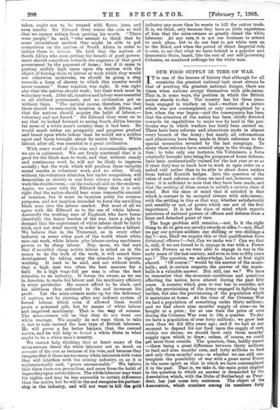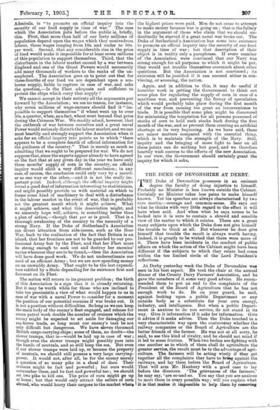OUR FOOD SUPPLY IN TIME OF WAR.
IT is one of the lessons of history that although for all countries the greatest national task must always be that of averting the greatest national danger, there are times when nations occupy themselves with side-issues. That is, in some ways, the position in which the British nation stands to-day. The country has for three years been engaged in warfare on land—warfare of a nature which was not contemplated, or only contemplated by a few, when the war began—and the consequence has been that the attention of the nation has been chiefly directed towards its capabilities to make war by land in the par- ticular way in which warfare has lately been carried on. There have been reforms and alterations Made in almost every branch of the Army ; but nearly all reformations and alterationshave been made in direct reference to the special necessities revealed by the last campaign. To many those reforms have seemed steps in the wrong direc- tion: to take only one instance, the Volunteers, a force originally brought into being for purposes of home defence, have been systematically trained for the last year or so as if their duty was to know how to work in open order on a naked veld rather than to be able to shoot down raiders from behind Kentish hedges. Into the question of the value of such reforms as these we need not, however, enter here ; it is sufficient to note that they have been made, and that the making of them seems to satisfy a certain class of mind. But the class of mind that is satisfied is that which is content to be occupied always with side-issues; with the settling in this or that way, whether satisfactorily and sensibly or not, of points which are not of the first importance. It is not the class of mind which regards questions of national powers of offence and defence from a large and detached point of view.
The huge problem still remains,—not, Is it the right thing to do to give our cavalry swords or rifles P—not, Shall we pay our private soldiers one shilling or two shillings a day P—not, Shall we require this or that qualification from divisional officers ?—but, Can we make war ? Can we, that is, still, if we are forced to it, engage in war with a Power or with Powers as we were able to engage in war in the early years of the last century, and even so late as fifty years ago ? The question, we acknowledge, looks at first sight absurd. "Of course ! " would be the answer of the music- halls; and, in certain respects, the answer of the music- halls is a valuable answer. But still, can we ? We have to remember that the economic conditions and questions affecting the nation have altered during the past fifty years. A country which goes to war has to consider, not only the provisioning of the Army engaged in fighting its battles, but also the provisioning of the population which it maintains at home. At the time of the Crimean War we had a population of something under thirty millions; and we had about nine months' supply of corn—to b bought at a price ; for at one time the price of corn during the Crimean War rose to 52s. a quarter. To-day we have a population of over forty millions; we grow less corn than we did fifty years ago ; and if we had at any moment to depend for our food upon the supply of corn within our shores, we should have only three months' supply upon which to draw; unless, of course, we could get more from outside. The question, then, baldly stated —there being a great difference between thirty millions to feed and nine months' corn, and forty millions to feed and only three months' corn—is whether we can still con- template the possibility of war with a great naval Power in the same spirit as that in which we have contemplated it in the past. That is, we take it, the main point implied in the question to which an answer is demanded by the Association which, with the Duke of Sutherland as Presi- dent, has just come into existence. The object of the Association, which numbers among its members forty Admirals, is "to promote an official inquiry into the security of our food. supply in time of war." The case which the Association puts before the public is, briefly, this. First, that more than half of our forty millions of population depend upon the wages which they receive from labour, those wages ranging from 18s. and Under to 50s. per week. Second, that any considerable rise in the price of food. would make it impossible for at least seven millions of this population to support themselves. Third, that the disturbance in the labour market caused by a war between England and. one of the Great Powers would. necessarily add many thousands of workers to the ranks of the un- employed. The Association goes on to point out that for three-fourths of our food we are dependent upon a sea- borne supply, liable to capture in case of war, and asks the question,—Is the Fleet adequate and. sufficient to protect the ships which carry that supply ?
We cannot accept in their entirety all the arguments put forward by the Association; we see no reason, for instance, why seven millions of wage-earners should find it "im- possible to support themselves" if wheat went up to over 508. a quarter, when, as a fact, wheat went beyond that price during the Crimean War. We readily admit, however, that the outbreak of war between ourselves and a great naval Power would seriously disturb the labour market, and we can most heartily and strongly support the Association when it asks for an official inquiry into points as to which "there appears to be a complete dearth of official information for the guidance of the country." That is merely as much as admitting that we ought to be prepared for war. We do not suppose that, since the experts appear already to have agreed. on the fact that at any given day in the year we have only three months' supply of corn in the country, an official inquiry would elicit a very different conclusion; in any case, of course, the conclusion could only vary by a month or so one way or the other,—and it is not the really im- portant point. Indeed, although the official inquiry might reveal a good deal of information interesting to statisticians, and might possibly provide us with material on which to frame some kind of machinery to deal with a disturbance in the labour market in the event of war, that is probably not the greatest result which it might achieve. What it might achieve, and what this Association might, and we sincerely hope will, achieve, is something better than a plan of action,—though that per se is good.. That is a thorough awakening of the country to the necessity of a strong Navy. If the Duke of Sutherland's Association can divert attention from side-issues, such as the Boer War, back to the realisation of the fact that Britain is an island, that her frontiers are not to be guarded by our pro- fessional Army but by the Fleet, and that her Fleet must be strong enough to seek out and destroy her enemies' navies wherever they are to be found,—then the Association will have done good work. We do not underestimate our need of an efficient Army ; but we are now spending money on an unwieldy Army. That ought to be the last expendi- ture ratified by a State depending for its existence first and foremost on its Fleet.
The nation will return to its greatest problem ; the birth of this Association is a sign that it is already returning. But it may be worth while for those who are inclined to take too pessimistic a view of what would happen to us in case of war with a naval Power to consider for a moment the position of our potential enemies if war broke out. It Is not a position without difficulties. So long as we can keep the main body of the enemy's fleet engaged, and release for ocean patrol work double the number of cruisers which the enemy might be expected to set aside for damaging our sea-borne trade, so long must our enemy's task be not only difficult but dangerous. We have eleven thousand British cargo-carrying ships ; some of them, no doubt—the Slower tramps, that is—would be laid. up in case of war ; though even the slower tramps might possibly pass into the hands of neutrals, and so still keep the sea. But even if our slower tramps were laid up, or became the property of neutrals, we should still possess a very large carrying- power, It would. not, after all, be for the enemy merely a question of so many pike in a shoal of dace. Their cruisers might be fast and powerful ; but ours would outnumber them, and be fast and powerful too ; we should. set two pike to kill one. The price of corn might go up at home; but that would only attract the sellers of corn abroad, who would hurry their cargoes to the market where the highest prices were paid. Men do not cease to attempt to make money because war is going on ; that is the fallacy in the argument of those who claim that we should un- doubtedly be starved if a great naval war broke out. The Duke of Sutherland's Association has come into existence to promote an official inquiry into the security of our food supply in time of war ; but that description of their object is in reality only a paraphrase. If every member of the Association were convinced that our Navy was strong enough for all purposes to which it might be put, they would. not trouble themselves overmuch about other questions. But the Association is not convinced ; its existence will be justified if it can succeed either in con- vincing, or arousing, the nation.
Again, and in addition to this, it may do useful if humbler work in getting the Government to think out some plan for regulating the supply of corn in case of a maritime war, and preventing the frenzy of speculation which would probably take place during the first month of the war from causing too great an inconvenience to trade. It is possible that some plan might be discovered for minimising the temptation for all persons possessed of stocks of corn to hold such stocks back during the first month of the war, and so prevent them creating an artificial shortage at its very beginning. As we have said, these are minor matters compared with the essential thing, which is to maintain the strength of the Navy. Still, inquiry and. the bringing of more light to bear on all these points can do nothing but good, and we therefore heartily wish success to the efforts of the new Association. In our view, the Government should certainly grant the inquiry for which it asks.











































 Previous page
Previous page